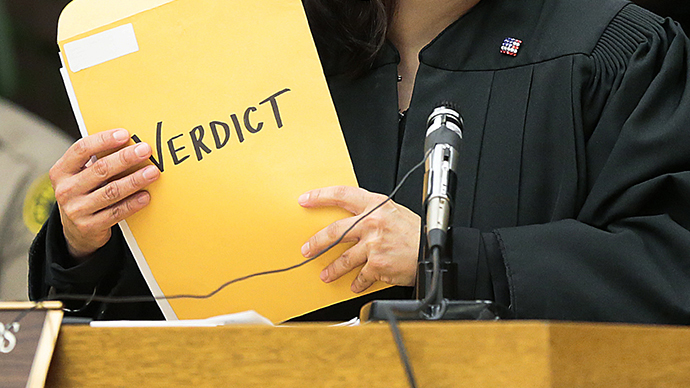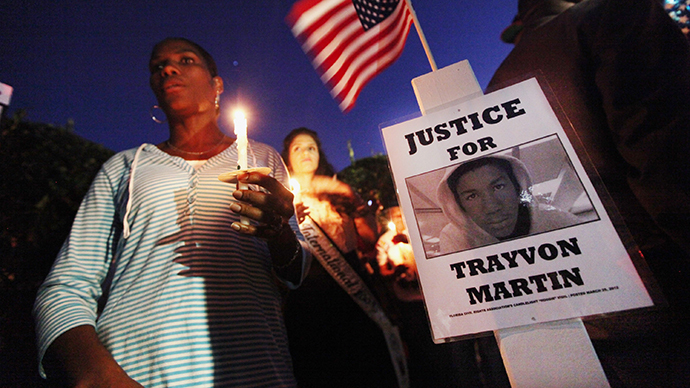Media access to Florida ‘Stand Your Ground’ details could be drastically reduced

A Florida lawmaker is attempting to curb the media’s access to 'Stand Your Ground' court records after a local newspaper review examined hundreds of cases and found that the controversial law is applied unevenly and with unpredictable results.
Representative Matt Gaetz, a Republican representing Fort Walton Beach, proposed an amendment to a state bill that would greatly limit the public’s ability to view records from self-defense cases.
Stand Your Ground is an increasingly popular defense used in a number of US states that, depending on the location, permits an individual to use lethal force in a situation where they think their life is at risk. Such laws have come under greater scrutiny since George Zimmerman was found not guilty of murdering Trayvon Martin, a teenager who Zimmerman maintained attacked him in a Florida neighborhood.
A number of controversial cases have followed, with the Tampa Bay Times analyzing 200 cases in Florida and finding that the shooters went unpunished 113 (68 percent) times. In 135 cases, the victim was unarmed, while the accused was armed in 121 cases.
“The number of cases is increasing, largely because defense attorneys are using ‘stand your ground’ in ways state legislators never envisioned,” the Times explained in the study. “The defense has been invoked in dozens of cases with minor or no injuries. The defense has been used in a wide assortment of cases, including by a self-described ‘vampire’ in Pinellas County, a Miami man arrested with a single marijuana cigarette, a Fort Myers homeowner who shot a bear and a West palm Beach jogger who beat a Jack Russell terrier.”

In the first revision to the bill since Trayvon Martin’s death, the Republican-controlled Florida House is expected to pass a stipulation to Stand Your Ground that would permit residents to fire warning shots in a life threatening situation without being vulnerable to a mandatory sentence for using a weapon. Included in that bill is Gaetz’s amendment. However, the representative maintains that his stipulation has nothing to do with media pressure.
“The point is to make sure that someone who appropriately uses the Stand Your Ground defense doesn’t have their life ruined by that defense,” he said. He claimed that the Times would have been able to conduct its investigation even with this amendment in place because the examination was based on “media reports.” When advised that the review in fact was based on court documents from prosecutors and defense attorneys, though, Gaetz changed his potion.
“I’ll look into it,” he told the Times. “It’s not the intent of the bill to limit our access to data regarding the use of the defense and crime statistics. At that extent, we’ll certainly take a look at it.”
The warning shot measure has earned support from both Democrats and Republicans because it is partly inspired by the case of Marissa Alexander, a Jacksonville woman sentenced to 20 years in prison for firing a warning shot into her own ceiling during a dispute with her husband. An appeals court recently ruled that Alexander will receive a new trial.
Yet the privacy provision is less accepted. Marion Hammer is the former president of the National Rifle Association and personally wrote the bill that became the initial Stand Your Ground law. He is an outspoken advocate of the Gaetz amendment and told Mike Van Sickler of the Miami Herald that public policy is none of the newspaper’s business.
“It’s overreach on the media’s part to think they need to know everything about everybody’s life,” he said. “The media wants to know this so they can create news. Privacy is an important thing in America. When people are wronged it should be repaired, and it shouldn’t be anybody’s business.”
Neil Brown, the Times’ editor and vice president, told Media Matters that not only did the Times analysis become a finalist for numerous awards, it became the springboard for much of the public conversation that continues to surround Stand Your Ground and gave other media outlets a prism to view the law through.
“Closing records and putting controversial cases that involve violence into the dark is a bad idea, it is against democracy,” he said. “This would have inhibited our work further. Our work was done based on court records as well as the stories of the incidents when they occurred.”














